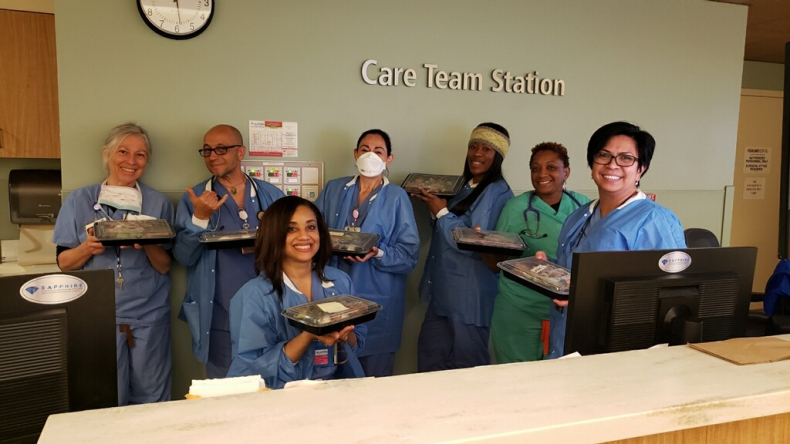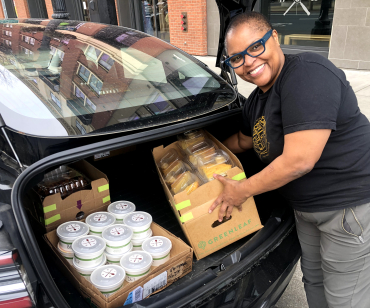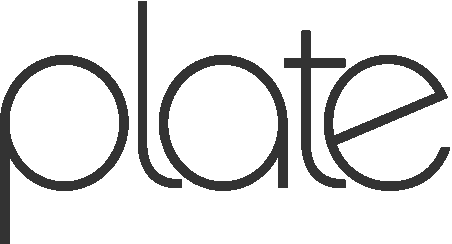Chefs
Restaurants Pivot to Feed Hospital Workers to Give Back and Stay in Business
Editor's Note: Plate is making coverage of the coronavirus available to all readers. Find more articles here.
Comforting Cambodian-style chicken curry, courtesy of Nyum Bai. Creamy macaroni and cheese, earthy collard greens, and crispy fried chicken from soul food spot Brown Sugar Kitchen. Hearty kale and quinoa salad with harissa chicken, along with seasonal green garlic and spinach quiche via The Cook and Her Farmer café. Oakland, Calif., chefs—like many others around the country—are feeding doctors and nurses well on the frontlines of the COVID-19 pandemic
It is simply the right thing to do in the midst of this unprecedented crisis, say these chefs, who add that they are honored to contribute in the fight to combat the novel coronavirus. It also might help keep restaurants on life support. In communities across the country, privately-funded and crowdsourced campaigns have sprouted, pairing independent restaurants—from fast casual burger joints to fine dining standouts—with hospital emergency departments and intensive care units in an effort to nourish healthcare workers battling the deadly disease.
These initiatives are being heralded as a win-win-win for all participants during a time of tremendous need. Restaurant chefs can keep their kitchens running and pay staff. Hospital workers can focus on the difficult task at hand without wondering where their next meal is coming from, and citizens in search of a charitable outlet can make an immediate, tangible difference with a financial donation.
“Eating tasty, satisfying food that is suitable for delivery and prepared with thought, safety, and care is a morale booster for frontline workers,” says Jenny Schwarz, co-owner, with Chef Kyle Itanti, of the upscale Oakland diner Hopscotch. “Cooking meals gives restaurants a chance to survive this crisis and donating funds helps us unite together as a community.” Schwarz runs the restaurant logistics end for East Bay FeedER, which has partnered with Nyum Bai, BSK, TCAHF, Itani Ramen, Hawking Bird, Miss Ollie’s, Nido’s Backyard, and other local restaurants.
To date, the organization has delivered more than 1,500 meals and is now serving seven area hospitals, according to its website. Starting with a GoFundMe, a website, and a crew of restaurant industry, tech, and delivery volunteers, East Bay FeedER raised $150,000 in its first two weeks of operation; it is now officially partnered with José Andrés' World Central Kitchen for outreach in the East Bay. Around 150 brick-and-mortar businesses signed up to offer their services, says Schwarz. “We’re working on a way to have some sort of rotation system so there is consistent service, and also so it’s impactful for the restaurants we partner with,” she says. “The goal here is to help restaurants remain viable, with at least one delivery of meals every two weeks.” East Bay FeedER hopes to scale up to serve three hospital shifts a day, with several restaurants each day providing 40 or more meals.
One ER doctor, thankful to receive a hot dinner, told the East Bay FeedER team that before they started delivering he’d eaten his last three meals from a vending machine. Another hospital worker burst into tears of gratitude for the freshly-cooked food.
There are logistics beyond regular home delivery when dropping off meals to a hospital in the middle of a pandemic, says Schwarz. In order to maintain social distancing advisories and to prevent transmission of the coronavirus along the supply chain, restaurant workers cook meals, package them individually, and then leave them in a designated spot for volunteers to collect. Gloved and masked drivers take the boxes of food to hospitals, but they do not carry them inside. Hospital staff meet drivers outside and take the containers of food and carry them back into the hospitals themselves.
These programs come in different models. Some are launched by celebrity actors, athletes, authors, tech titans, or venture capitalists who pick up all or a portion of the tab from their own deep pockets. Others are kickstarted by local residents who want their favorite neighborhood dining spots and food businesses to survive at the same time they want to support community hospital workers. Oak Park Working Moms in Illinois has raised over $10,000 to date to do just that. Still others are sparked by restaurants themselves: Escape from New York Pizza in San Francisco is raising funds to deliver pies to hospital workers and first responders and documenting their deliveries on Instagram. (There’s also Pizza vs Pandemic, a national organization that matches pizzerias, donors, and local hospitals.)
Many of these feeding programs came about organically, as restaurants around the country endure record layoffs and closures as shelter-in-place and lockdown measures ban dining out. Restaurants that have remained open must now rely on income from takeout, which often represented a small percentage of sales before COVID-19 hit. These restaurant-to-hospital meal train services are quickly springing up in Seattle, New York City, New Orleans, Detroit, and Chicago as these cities emerge as pandemic hot pockets in the country.
“Over the past week, as we've thought about how best to take care of workers in our industry (restaurants), our minds also turned to who else could use our help right now,” reads the opener to The London Plane in Seattle’s GoFundMe campaign for hospital workers. “How could we share a resource—The London Plane kitchen—with those who are working on the front lines to contain this pandemic and treat the sick?” In under two weeks, the upscale restaurant raised $80,000, employed 40 restaurant workers and delivered 13,000 meals to area hospitals.
These are all-volunteer efforts without administrative overhead; volunteers handle the operational end so chefs can focus on meal prep. Still, the concept isn’t cheap; typically, meals are purchased at full price from restaurants. But the cause has proven popular with givers and receivers. “We get feedback from the hospitals every day about how great the food is and how grateful they are,” says Schwarz.

In Los Angeles, World Central Kitchen partnered with Help Feed the Frontline LA, which has raised close to $300,000 to date for six local hospitals. Participating restaurants include Bacari, Local Kitchen + Wine Bar, M Café, Marmalade Café, Pacifique, Playa Provisions, and Thyme Café. The effort began hyper-locally with a small group of moms, including chef Brooke Williamson of Hudson House, The Tripel, and Playa Provisions, who wanted to match restaurant meals with hungry hospital staff.
“It’s been a truly frightening time for restaurant owners. I’ve been itching to do something beyond our traditional restaurant service in order to help those most at risk,” says Williamson. “The creation of Help Feed the Frontline LA helps keep our business up-and-running and our employees working, while allowing us to play a larger role in supporting the brave medical professionals who are making sacrifices each and every day. The locals’ donations to this cause make that possible.”
World Central Kitchen has also partnered with Frontline Foods, a San Francisco group cooked up after a conversation between an emergency room nurse, an entrepreneur, and a venture capitalist with ties to the restaurant industry. What started out as The COVID Clinician Meal Support Program, has led to local hospital employees being fed by restaurants such as Cockscomb, Nightbird, Prubechu, and RT Rotisserie. The organization is expanding, with efforts now in 10 other cities, including New York, Austin, and Denver, with more in the works. In just over two weeks, Frontline Foods has delivered more than 7,500 meals nationally from over 100 restaurants and raised more than $700,000. “With medical professionals working 16 hours a day or more, and no time at home to make meals, hospital cafeterias running short on staff and restaurants surrounding hospitals now closed, clinicians need easier access to food so they can be their best when it comes time to keep us all safe from this clear and present threat,” writes Frontline Foods co-founder Ryan Server. “At the same time, our friends in the restaurant industry have been devastated by shelter-in-place orders, having their livelihoods taken from them—forcing them to suddenly and jarringly shut down. Bringing these two needs together has now lifted communities across the country searching for a way to help.”
In Washington state, which was hard hit by the epidemic early on, at least one fine dining restaurant has totally reinvented itself as a hospital food relief provider. The Herbfarm, which in pre-COVID days was known for its themed nine-course meals, has launched a GoFundMe to fuel its current efforts to feed the frontline. For restaurant owners Carrie Van Dyck and Ron Zimmerman and Chef Chris Weber, the concept is not just about providing satisfying food for hospital workers and employing their staff. They also want to ensure that their industry partners—farmers, fishers, foragers, ranchers—have outlets for their product. The impetus for the effort came courtesy of a guest, who has also spearheaded the back-end logistics, according to a story in The Stranger.
“For a moment, the cinnamon and apple reminded me of fun nights at the pumpkin farm and the trout chowder brought me back to river fishing with my dad (who I will not be able to see until this is over because he is 84 and too high-risk to see his daughter who is a caring for confirmed COVID-19 cases),” wrote one grateful recipient. “The fresh herbs made me miss the vegetable garden I would normally be preparing with my grandma, who also must now avoid contact with me. You provided me with more than just a meal, but a moment to reflect on the joys of life amongst the current chaos, uncertainty, and grief so many are experiencing.”
In New York City, which is experiencing the largest number of COVID-19 cases in the United States, restaurants are also stepping up. Brooklyn stalwart Peter Luger Steakhouse has provided lunch for healthcare workers, while Brooklyn Chop House is serving nine hospitals dinner. The restaurant estimates it delivers 150 to 250 meals a day. Three East Village Taiwanese restaurants, 886, Ho Foods, and Raku, have teamed up to provide bento boxes at city hospitals. For 886’s Eric Sze, there’s a personal connection: One of his oldest friends is a doctor at The Mt. Sinai Hospital. They’re accepting donations via Venmo.
In New Orleans, the charity Feed the Frontline NOLA, an offshoot of Krewe of Red Beans, a Mardi Gras club founded by artist Devin De Wulf to honor his favorite local dish, has raised more than $90,000 from its GoFundMe. It also provides funding for out-of-work musicians and artists, who serve as delivery drivers. Around 30 restaurants, including Blue Giant Chinese, Galaxie Tacos, and Heard Dat Kitchen, now provide around 1,200-1,400 meals a day to about a dozen area hospitals.

While these organizations want to help as many restaurants as they can, chefs acknowledge that they have to find other outlets for their food to remain viable beyond delivering to hospitals once a week or so. In San Francisco, Twitch CEO Emmett Shear donated $1 million to start a new nonprofit called the SF New Deal that will connect restaurants with hospitals, churches, and other organizations, paying them to serve meals to people in need. Brown Sugar Kitchen has teamed up with the payment processing company Marqeta, which has set up a fund called Oaklanders Supporting Oaklanders, that will provide hundreds of meals a week to nonprofits that support the homeless, foster youth, and families in need. “The combination of these efforts—along with our takeout business—allows us to keep our lights on and employ three staff,” says Chef/Owner Tanya Holland. “We’re working really hard and we’re grateful for all the opportunities to feed people right now.”
For restaurant industry folks, it’s not just about getting paid to keep their stoves burning and a skeleton crew working. Many want to feel they’re contributing to the fight against COVID-19. Feeding hospital staff “gives me a greater purpose,” says Nite Yun of Nyum Bai, who has cooked for both East Bay FeedER and Frontline Foods. “It’s an incredible feeling to be able to nourish the doctors and nurses who are in the frontline. They are true heroes in my eyes.”
Sarah Henry covers culture through the lens of food from her base in Berkeley, Calif.

Kathie H. replied on Permalink